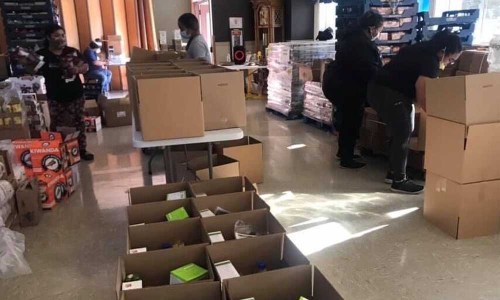Challenges of hunger face Eastern Oregon’s Pacific Islander community
Published 3:00 pm Wednesday, December 16, 2020

- Volunteers with Eastern Oregon CANN pack food boxes for distribution to the local pacific islander community. In their two previous events, EO CANN delivered more than 8,000 pounds of food to more than 120 local families. Their next distribution is Saturday, Dec. 19, 2020.
LA GRANDE — The COVID-19 pandemic has exacerbated an already colossal problem of food insecurity in the United States. With nearly one in three children and one in six people overall in Union County now unsure where their next meal might come from, the bite of hunger is present and raw in Northeast Oregon.
In the local Pacific Islander community, challenges in putting food on the table are exacerbated by a struggle to find culturally relevant and fulfilling food, desires to avoid xenophobic stigma and barriers in navigating an unfamiliar society.
“Even though we struggle with food access, many folks don’t know that (food assistance) is available to them, whether that be just a language barrier and they don’t know how to access it or they know it’s available but they don’t want, you know, the handouts,” said Tyana Musrasrik, president of Eastern Oregon Cofa Alliance National Network, a Pacific Islander advocacy group. “And especially, there are some attitudes of ‘the immigrants’ and looking down, we’re always looking for handouts, those sort of misconceptions. So, many folks don’t want to be that group.”
Eastern Oregon CANN has been working to combat food insecurity in Union County by distributing food boxes that contain culturally relevant foods such as rice, taro and breadfruit. Musrasrik said finding those foods can be difficult, especially when a person has to rely on aid services such as food banks.
“It’s not affordable,” Musrasrik said, “because who wants to bring these foods into rural Union County, Eastern Oregon?”
Because Pacific Islanders often purchase rice in 20 or 40 pound sacks rather than by the box, as is most available locally, they have to drive as far as the Tri-Cities in Washington to meet their dietary needs. This further exacerbates the issue of food insecurity for those who lack access to personal transportation.
Many in the Pacific Islander community also work in jobs that have been deemed “essential” during the COVID-19 pandemic — food service and grocery stores workers, for example — increasing the pandemic’s impact on them.
Further complicating things, Musrasrik said those in the local Pacific Islander community often are reluctant to accept help when it’s offered, let alone seek it out. Misconceptions about immigrants in general, she said, make them reluctant to take handouts.
“The effect (of misconceptions) is just making do with what we can and trying to get by, so that’s why I’m hoping with these food box distributions,” Musrasrik said. “I’m making it so they sign up, it’s confidential and I’m delivering it right to their door so they don’t need to come and get it themselves and ask for the help. I’m offering it and I will bring it right to you.”
Eastern Oregon CANN held two two food box distributions earlier this year, delivering more than 8,000 pounds of food to more than 120 families each time. The next distribution is Saturday, Dec. 19.
Musrasrik said EO CANN accomplished the distributions with 10 to 12 volunteers who pack the food and deliver it in their personal vehicles.
“I think that’s just our mindset as Pacific Islanders,” Musrasrik said. “It’s very different from the American attitude of ‘every man for himself.’ I think we have that village mindset of we don’t leave people behind, we help each other as much as we can, even if we don’t have a lot.”
Those willing to offer help with the food box distributions can reach out to Tyana Musrasrik at tyanam@eocann.org to volunteer. Volunteers can help pack food boxes or deliver them in their vehicles.









